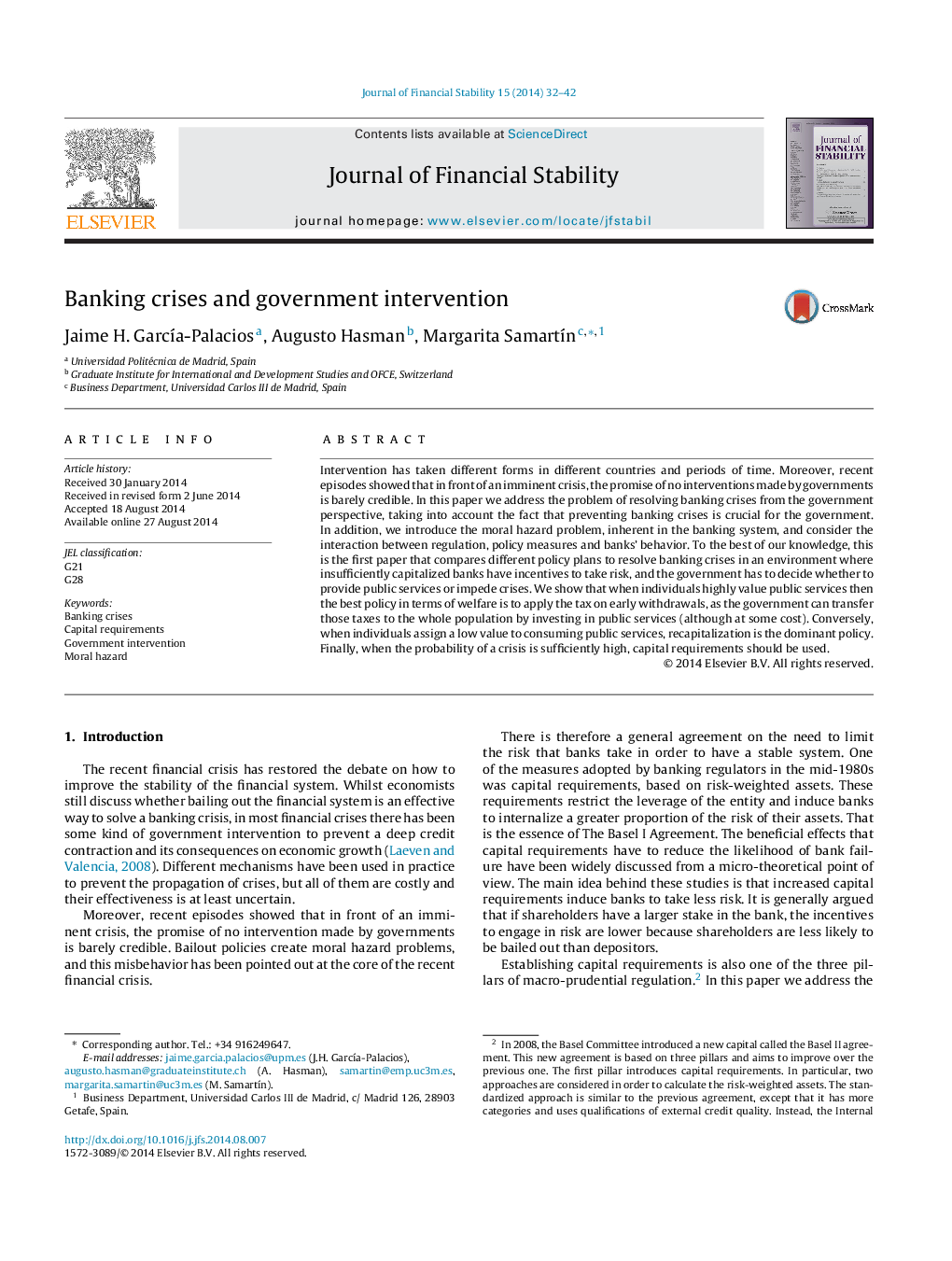| کد مقاله | کد نشریه | سال انتشار | مقاله انگلیسی | نسخه تمام متن |
|---|---|---|---|---|
| 7409551 | 1481536 | 2014 | 11 صفحه PDF | دانلود رایگان |
عنوان انگلیسی مقاله ISI
Banking crises and government intervention
ترجمه فارسی عنوان
بحران بانکی و دخالت دولت
دانلود مقاله + سفارش ترجمه
دانلود مقاله ISI انگلیسی
رایگان برای ایرانیان
کلمات کلیدی
ترجمه چکیده
مداخله اشکال مختلفی را در کشورهای مختلف و دوره های زمان گرفته است. علاوه بر این، قسمت های اخیر نشان داد که در برابر بحران قریب الوقوع، وعده هیچ مداخله ای توسط دولت ها به سختی قابل اعتماد نیست. در این مقاله ما به حل بحران های بانکی از منظر دولت رسیدگی می کنیم، با توجه به این واقعیت که جلوگیری از بحران های بانکی برای دولت بسیار مهم است. علاوه بر این، ما مسئله خطر اخلاقی را که در نظام بانکی وجود دارد، معرفی می کنیم و تعامل بین تنظیم، اقدامات سیاستگذاری و رفتار بانک ها را در نظر می گیریم. برای کسب اطلاعات بیشتر، این اولین مقاله است که طرح های مختلف سیاست گذاری را برای حل بحران های بانکی در محیطی که بانک های با سرمایه کافی ندارند انگیزه ای برای ریسک در نظر می گیرند و دولت باید تصمیم بگیرد که آیا خدمات عمومی یا مانع بحران را در بر دارد. ما نشان می دهیم هنگامی که افراد ارزش خدمات عمومی را بالا می برند، بهترین سیاست در راستای رفاه این است که مالیات بر خروج زودهنگام را اعمال کند؛ چرا که دولت می تواند این مالیات را با سرمایه گذاری در خدمات عمومی (و در برخی هزینه ها) به کل مردم انتقال دهد. برعکس، زمانی که افرادی که ارزش کمتری برای مصرف خدمات عمومی به دست می آورند، کمک های سرمایه ای سیاست غالب است. سرانجام، زمانی که احتمال بحران به اندازه کافی بالا باشد، الزامات سرمایه باید مورد استفاده قرار گیرد.
موضوعات مرتبط
علوم انسانی و اجتماعی
اقتصاد، اقتصادسنجی و امور مالی
اقتصاد، اقتصادسنجی و مالیه (عمومی)
چکیده انگلیسی
Intervention has taken different forms in different countries and periods of time. Moreover, recent episodes showed that in front of an imminent crisis, the promise of no interventions made by governments is barely credible. In this paper we address the problem of resolving banking crises from the government perspective, taking into account the fact that preventing banking crises is crucial for the government. In addition, we introduce the moral hazard problem, inherent in the banking system, and consider the interaction between regulation, policy measures and banks' behavior. To the best of our knowledge, this is the first paper that compares different policy plans to resolve banking crises in an environment where insufficiently capitalized banks have incentives to take risk, and the government has to decide whether to provide public services or impede crises. We show that when individuals highly value public services then the best policy in terms of welfare is to apply the tax on early withdrawals, as the government can transfer those taxes to the whole population by investing in public services (although at some cost). Conversely, when individuals assign a low value to consuming public services, recapitalization is the dominant policy. Finally, when the probability of a crisis is sufficiently high, capital requirements should be used.
ناشر
Database: Elsevier - ScienceDirect (ساینس دایرکت)
Journal: Journal of Financial Stability - Volume 15, December 2014, Pages 32-42
Journal: Journal of Financial Stability - Volume 15, December 2014, Pages 32-42
نویسندگان
Jaime H. GarcÃa-Palacios, Augusto Hasman, Margarita SamartÃn,
